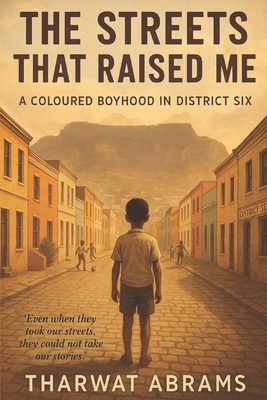District Six: The Streets That Raised Me

District Six: The Streets That Raised Me
Our house was like most others in the area-small, tired, and alive. A two-bedroom, semi-detached Victorian relic that leaned a little to the left, just like Pa's walk after a long shift at the docks. It was the kind of house that groaned when the wind blew and sighed when the sun hit the floorboards. It was where five children, two parents, one grandmother, and a cat named Tommie somehow found enough space to live, laugh, and sometimes fight. Not about big things-just the usual: who stole the last piece of bread, who used all the hot water, who lost Pa's lighter.
My earliest memories are stitched together like a patchwork quilt: Ma's hands kneading dough on the kitchen table, Pa humming old Nat King Cole tunes while fixing a broken radio, my brothers chasing each other through the alley behind the house, and the smell of onions frying in oil-always onions first.
District Six had its own heartbeat. Mornings began with the hiss of kettles, the rattle of delivery carts, the echo of children crying and playing at the same time. The men rushed off to jobs that barely paid, and the women ran households that ran the world. You could hear the click-clack of aunty's slippers on the pavement as she fetched bread and milk from the corner shop. Everything had rhythm. Even sorrow. Even struggle.
My Ma, Fatima, was born in the Bo-Kaap and carried with her a quiet strength wrapped in a floral doek. She had a sharp tongue, but a soft heart. Her laugh came from her belly and her temper from her eyes. She made dresses for rich white women in Gardens but came home to stitch holes in my school socks. She taught me that dignity didn't come from what you wore, but how you treated people. Her knuckles were always bruised from the needle, but she still managed to hold us all together like thread in a hem.
Pa, Abraham, was a man of few words, except when he had a dop or two. Then he'd become a philosopher, a preacher, a storyteller. He worked on the docks by day and sat in silence most nights, his body broken by labour, his spirit held together by pride. He believ
PRP: 77.42 Lei
Acesta este Prețul Recomandat de Producător. Prețul de vânzare al produsului este afișat mai jos.
69.68Lei
69.68Lei
77.42 LeiLivrare in 2-4 saptamani
Descrierea produsului
Our house was like most others in the area-small, tired, and alive. A two-bedroom, semi-detached Victorian relic that leaned a little to the left, just like Pa's walk after a long shift at the docks. It was the kind of house that groaned when the wind blew and sighed when the sun hit the floorboards. It was where five children, two parents, one grandmother, and a cat named Tommie somehow found enough space to live, laugh, and sometimes fight. Not about big things-just the usual: who stole the last piece of bread, who used all the hot water, who lost Pa's lighter.
My earliest memories are stitched together like a patchwork quilt: Ma's hands kneading dough on the kitchen table, Pa humming old Nat King Cole tunes while fixing a broken radio, my brothers chasing each other through the alley behind the house, and the smell of onions frying in oil-always onions first.
District Six had its own heartbeat. Mornings began with the hiss of kettles, the rattle of delivery carts, the echo of children crying and playing at the same time. The men rushed off to jobs that barely paid, and the women ran households that ran the world. You could hear the click-clack of aunty's slippers on the pavement as she fetched bread and milk from the corner shop. Everything had rhythm. Even sorrow. Even struggle.
My Ma, Fatima, was born in the Bo-Kaap and carried with her a quiet strength wrapped in a floral doek. She had a sharp tongue, but a soft heart. Her laugh came from her belly and her temper from her eyes. She made dresses for rich white women in Gardens but came home to stitch holes in my school socks. She taught me that dignity didn't come from what you wore, but how you treated people. Her knuckles were always bruised from the needle, but she still managed to hold us all together like thread in a hem.
Pa, Abraham, was a man of few words, except when he had a dop or two. Then he'd become a philosopher, a preacher, a storyteller. He worked on the docks by day and sat in silence most nights, his body broken by labour, his spirit held together by pride. He believ
Detaliile produsului













